综合英语1 Unit 7
- 格式:doc
- 大小:53.50 KB
- 文档页数:4
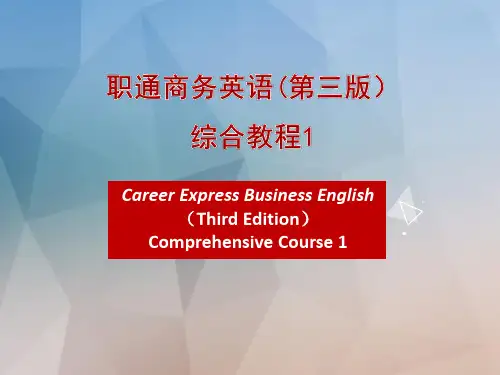

大学英语-综合教程1-Unit-7-What-Animals-Reall y-ThinkUnit 6 What Animals Really Think1. controversy: [U] [C] + over / about / oneg. There was a heated ~ over the building of the bridge.I was engaged in a ~ with / against her on the issue.contradiction: 矛盾 A is in contradiction with B.contradictory (adj.) A and B are contradictory.2. consciousness [U] 知觉,意识※conscious: adj. = awareeg. He is conscious of his mother’s anger.※conscience: [U] [C] 良心eg. have a clear ~ / have a guilty ~※conscientious: adj.eg. a conscientious worker3.explore①examine thoroughly, learn abouteg. to ~ the possibility of crossing the river.②travel over an area for the purpose of discoveryeg. to explore space / to explore a place on foot4.encounter (fml): come across, meet…unexpectedlyeg. We encountered a girl selling sea shells on the sea shore.※encounter: n. 遭遇eg. the ~ with enemiesConfront be confronted with…遭遇5. convince: make sb feel sure by the use of argument or evidence~ sb of sth / ~ sb that…使人相信→be convinced of / be convinced that…确信※convincing: adj. a ~ speech※convinced: adj. 有坚定立场的※convincible: adj. 可被说服的“The stories they tell us reveal whatanimal intelligence”1.2. We’6.make / do a deal (with sb.)deal: v.经营,买卖--- He runs a shop that deals in sea food.n.(colloq.)交易,成交---It’s a deal.dealer: trader, merchant7.only to (do sth.): do sth with a surprising, disappointing resulteg. He worked out a plan with great efforts, only to be ridiculed by the others.8.negotiate: ~ with sb / ~ to do… / ~ for…eg. The two companies both believe that they need to ~ to share the market.The workers will ~ for a pay increase of 4%.9.. relieve: (vt.) free sb from pain, anxiety, etc., ease sb's paineg. Drugs can relieve much of the pain.relieve sb. of stheg. A part-time job can relieve you of the financial burden.10. “careful bargainer that she was…”▲as, that, though引导的原因状语或让步状语从句eg.①Intelligent as / though he is, Tim is quite modest.②Hard as he tried, he couldn’t learn French well.③Child that he is, he can ride a horse.11. undertake: carry out, take upon oneself (a task)To ~ responsibility / a taskTo ~ the role of Juliet.12. expand: 数目,尺寸,量上的增长,金属的膨胀,领土的扩张extend: 比喻意义上的延长,扩展,“时、空”之延长/拓展The extended meaningExtend my stay in ShanghaiExtend one’s vision13. switch ( to sth…) 转换变成eg. He used to play tennis, but now he has switched to golf.Switch sth. on / off 接通、切断→switch n. 开关,闸14. in sb’s interest(s): in sb’s favour, to sb’s advantageeg.It will be in your interests to undertake this task.to work in the interests of humanity.15. go far: help very much, achieve much successeg. Mike is diligent and intelligent. He will go far.This is a new problem. I don’t think the old method will go far.16. judgment①opinion about stheg.—What has caused his failure in the examination, in your ~?—My ~ is that he has made a wrong ~ of his own ability?②the ability to form valuable opinions and make good decisionseg. He is promoted because of his excellent judgment.17. emergencyeg.※to make an ~ landing 紧急降落※In an ~, call 110.※The ~ services are the fire brigade, the police, and the ambulance service.18. halt①vi. / vt. Stop②vi. hesitate→to halt between two opinions③n. stop →come to a halt④halter: 缰绳19. release: (vt.) release sb. / sth. from…to ~ a bird from the cageto ~ his hold of the ropeto ~ a new film20. evidence①[U] ~ for …/ ~ of… / ~ that- / ~ to do…②pl.evidences 迹象,痕迹21. deceive: ~ sb. / ~ sb. into doing …The cheat deceived the old lady into buying the dyed little dog.22. inaccessible: beyond reach, unreachable, unavailable→accessiblea painting not accessible to the public→access: n. 通路an access to the castle23. give in ( to sb. / sth. ) = yield to sb. / sth.= surrender to…= submit to…= be subjected to…eg. Never give in to temptation!The parents gave in to the boy’s tears and bought him a computer.24. wipe out: get rid of, destroyeg. The village was wiped out in the flood.25. horizon: 海平线,水平线眼界,见识limit of one’s knowledge or experience horizontal line→vertical line。
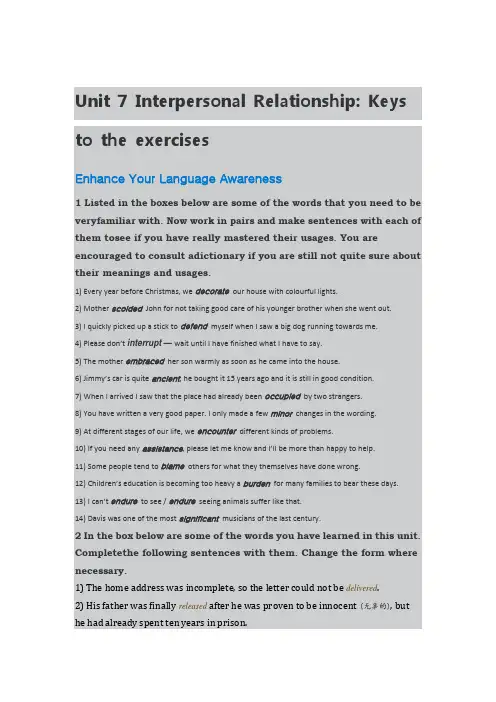
Unit 7 Interpersonal Relationship: Keys to the exercisesEnhance Your Language Awareness1 Listed in the boxes below are some of the words that you need to be veryfamiliar with. Now work in pairs and make sentences with each of them tosee if you have really mastered their usages. You are encouraged to consult adictionary if you are still not quite sure about their meanings and usages.1) Every year before Christmas, we decorate our house with colourful lights.2) Mother scolded John for not taking good care of his younger brother when she went out.3) I quickly picked up a stick to defend myself when I saw a big dog running towards me.4) Please don’t interrupt —wait until I have finished what I have to say.5) The mother embraced her son warmly as soon as he came into the house.6) Jimmy’s car is quite ancient; he bought it 15 years ago and it is still in good condition.7) When I arrived I saw that the place had already been occupied by two strangers.8) You have written a very good paper. I only made a few minor changes in the wording.9) At different stages of our life, we encounter different kinds of problems.10) If you need any assistance, please let me know and I’ll be more than happy to help.11) Some people tend to blame others for what they themselves have done wrong.12) Children’s education is becoming too heavy a burden for many families to bear these days.13) I can’t endure to see / endure seeing animals suffer like that.14) Davis was one of the most significant musicians of the last century.2 In the box below are some of the words you have learned in this unit. Completethe following sentences with them. Change the form where necessary.1) The home address was incomplete, so the letter could not be delivered.2) His father was finally released after he was proven to be innocent (无辜的), but he had already spent ten years in prison.3) Did he give you permission to use his computer?4) All rooms in this building are rented to students because it is closeto their university.5) When she recalled her miserable days during the war, my motherwould cry bitterly.6) When I told George that Maggie had refused to help, he exploded and walked out without saying anything.7) She pressed her dress smooth using a hot iron.8) With a(n) motion of his hand, he urged us to follow him.9) As soon as she accepted the job, Janet started working with great enthusiasm.10) Though she is over seventy, she is blessed with excellent health.11) The old woman was hurt so deeply by what his son had said thatshe trembled with rage.12) Just complete the attached form and return it in the envelopeprovided.13) The waiter inquired whether we would like to sit near the window.14) You’ve been working all morning — you now deserve a rest.3 In the boxes below are some of the expressions you have learned in this unit. Doyou understand their meanings? Do you know how to use them in the propercontext? Now check for yourself by doing the blank-filling exercise. Change theform where necessary.1) She is a very responsible lady; with her in charge, I am sure nothingwill go wrong.2) We were half way on our journey when our car broke down.3) I have lost my watch and I am quite certain I lost it on my way to thecomputer room.4) The child is very independent. He wants to make all importantdecisions by himself.5) This little girl is a dancing genius; she could dance in time to themusic as young as three years old.6) Our manager has to deal with all kinds of complaints the staffmembers make.7) She knew her subject from top to bottom and breezed through theexam in less than an hour.8) Several days had gone by before we found the missing dog.9) To my surprise, I was given the job, even though I had sent in myapplication rather late.●Increasing Your Word Power1 A synonym is a word that has the same or nearly the same meaning as anotherword. Now identify synonyms by matching a word in Column A with anotherin Column B. Then complete the sentences with an appropriate word either inColumn A or in Column B. Change the form where necessary.1) They endured hours of backbreaking work in miserable conditions.2) Some of the boys in our class are going to skip today’s class; I wonderhow our teacher will respond to it.3) She is a teacher and spent most of her career in New York.4) The wearing of seat belts is required by the law.5) S ally didn’t feel quite well, but still dragged herself wearily out ofbed at fiveo’clock that morning.6) This new play was directed by Mike Johnson, assisted by Sharon Gale.7) It’s her birthday party so I need a gift of some sort to take along.8) Tom is a stubborn child who won’t obey his mother.9) I’m not joking; I’m serious.10) From the house come bursts of merry laughter.11) Our tour departs from Heathrow Airport on 31 March and returns16 April.12) Barbara scolded her son for being so naughty before the honourable guests.13) There are no significant differences between the two groups ofstudents in terms of their IQ.2 An antonym is a word that means the opposite of another word. Now identifyantonyms by matching a word in Column A with another in Column B. Thencomplete the sentences with an appropriate word either in Column A or inColumn B1) With no thought for his own safety, he ran into the burning buildingto save the child.2) He waited the whole day for her to call him back, but no phone callcame. He was so annoyed that he went to bed miserably.3) Listen! The girls are singing cheerfully in the next room. They mustbe having a lot of fun together.4) He did his work carelessly. That’s why he made so many mistakes.5) Jim knew absolutely nothing about the business when he joined thefirm.6) He looked round desperately for someone to help him.7) The news report does not mention who is to blame for the trafficaccident.8) He left his hometown as a poor, working class boy and returned as anextremely wealthy man.9) I don’t like the boring / dull atmosphere in our class; I thinkeveryone should try to be more active in class.10) She wanted to be the first woman to climb Mount Everest, andshealmost succeeded.3 The words in the box below can be used both as nouns and as verbs. Useeither the noun form or the verb form of the words to complete the followingsentences. Change the form where necessary.1) I got so mad with him that I slapped him hard across the face; I’mstill feeling sorry for what I did then.2) On my birthday one of my friends gave me a beautiful doll as a(n)present.3) She finally solved the problem! A smile lit up her face.4) The little donkey struggled under a heavy burden.5) He was so angry that he reached forward and gave her a(n) slap onthe cheek.6) Janet presented the director with an expensive painting as a partinggift from us all.7) I ordered a chicken and some beer and started eating and drinkingby myself.8) The lake was bathed in the soft light of the moon.9) The government is spending millions of dollars in its attempt to combat drug abuse (毒品滥用).10) She motioned me to come closer and slipped something into myhand.11) The strain on the cables (绳缆)supporting the bridge is enormous.12) You can place an online order and they will deliver the goods to thedoor.13) They strained the rope between the two posts.14) I don’t want to burden you with my problems.15) With a sweeping motion of his hand, he said, “Follow me closely.”16) Helen volunteered to have the New Year party at her house this year.17) The troops were exhausted after months of fierce combat.18) She now helps in a local school as a(n) volunteer three days a week.4 Did you notice the suffixes -ness, -ment in words such as illness, disappointmentin this unit? The suffix -ness can be put after many adjectives to form nouns, while -ment can be added to many verbs to form nouns.Now form nouns byadding -ness or -ment to the words given in the table and write down theChinese meaning for each.Adjectives / Verbs Suffixes Nouns Chinese Meaningsaccomplish-ment / -ness accomplishment 成就;造诣;完成adjust adjustment 调节;调整;校正appoint appointment 约会,约定;任命,委派aware awareness 意识;知道;觉悟calm calmness 平静;安静;镇静competitive competitiveness 竞争;竞争力develop development 形成;开发;发展effective effectiveness 效力;有效性encourage encouragement 鼓励;赞助;促进impulsive impulsiveness 冲动;推动;驱使Complete each of the following sentences with a proper word you have thusformed.1) There has been an increasing awareness that care of the elderly hasbecome a social problem.2) We need encouragement from each other in order to complete sucha huge project.3) With so many caregivers around her, the old woman feels a sense ofsecurity and calmness.4) To ensure competitiveness in market, the company spares no effortto improve the quality of its products.5) We are very proud of the accomplishments that we have made overthe past few years.6) If you want to see the director, you need to make a(n) appointment with him first.7) When travelling abroad, you should make necessary adjustments tothe cultural differences.8) Take your time and think about it twice so as to avoid impulsiveness in your decision.9) A series of clinical trials (临床试验)are conducted to test the effectiveness of the newly developed medicine.10) There have been significant technological developments in thiscountry in the last two decades.Grammar in ContextStudy the following sentences that appear in this unit, paying special attention tothe italicized parts. Reflect on the grammatical function of the present participles,and group them into different types.1) a. Adverbial of time: 2, 4, 62) b. Adverbial of reason: 9, 103) c. Adverbial of result: 84) d. Adverbial of accompanying circumstances: 1, 3, 5, 7Task 1: Rewrite the following sentences using a present participle clause.1) He sat silent in the corner. He was reading his favorite novel.He sat silent in the corner, reading his favorite novel.2) When she saw the traffic light turn green, she quickly crossed the road.Seeing the traffic light turn green, she quickly crossed the road.3) As he has engaged in the research for many years, he is quite familiar withthe topic.Having engaged in the research for many years, he is quite familiar with the topic.4) He didn’t know where the supermarket was, so he went up to the policemanto ask for directions.Not knowing where the supermarket was, he went up to the policeman to ask fordirections.5) A new economic stimulus plan is said to be unveiled, and it leads to a surgein the stock market.A new economic stimulus plan is said to be unveiled, leading to a surge in the stockmarket.Task 2: Rewrite the following sentences to avoid ambiguity or danglingconstructions.1) Opening the window, a butterfly flew into my study.Opening the window, I saw a butterfly flying into my study.Or: When I opened the window, a butterfly flew into my study.2) Weighing almost 100 pounds, he lifted up the stone with one arm.Weighing almost 100 pounds, the stone was lifted up by him with one arm.Or: Although the stone weighed almost 100 pounds, he lifted it up with one arm.3) Idling about all day and indulging in games, the teacher flunked (使…不及格) the student in the final exam.Idling about all day and indulging in games, the student was flunked by theteacher in the final exam. 4) Having lived in the small county for thirty years, everything is familiar to the old man.Having lived in the small county for thirty years, the old man is familiar witheverything.5) Having received the Nobel Prize in literature, the media bombarded (向…连续提问) Mo Yan with questions of various types.Having received the Nobel Prize in literature, Mo Yan was bombarded withquestions of various types from the media.ClozeComplete the following passage with words chosen from this unit. The initial letterof each is given.Being a good boss has never been easy for me. The most difficult part is not about work, but about d ealing (1) with relationships at the workplace. As each and every employee in my company is s ignificant (2) to its development, I needto give enough a ttention (3) and care to everyone and to be approachable to all.At the start of the business, I encountered difficult situations and I was unsure what the best way was to handle them. For example, when an employee made a mistake, I hesitated about whether to s cold (4) him or her. Would I appear to be an i mpatient (5) boss to my employees if I did so? Would they continue to make mistakes if I was too lenient? Sometimes, I had to s ettle (6) disputes among the employees if they did not see eye to eye with each other on some tasks. This too was difficult. Should I b lame (7) any party or should I d efend (8) anyone? Howwould I bring them to see their differences and find solutions without h urting (9) each other? Sometimes I also e ncountered (10) difficult employees who seemedto feel m iserable (11) whatever I did for them. Life has never been easy, but I have learned the ropes along the way. The essential principle is to treat the employees s incerely (12), appreciate their contributions to the company and reward them accordingly. My employees are happy to have me as their boss, and are offering me all the a ssistance (13) they could. They have great e nthusiasm (14)for their work and have contributed significantly to the company’s development. TranslationTranslate the following sentences into English, using the words given in brackets.1) 直起身来,脚要跟上音乐拍子。

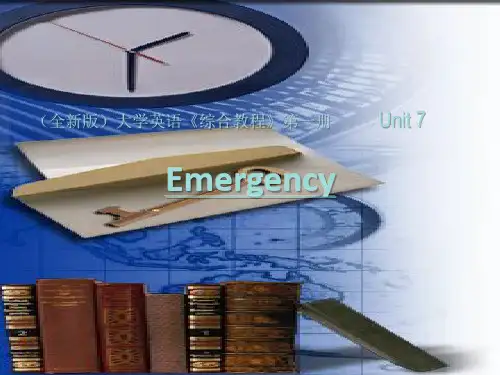
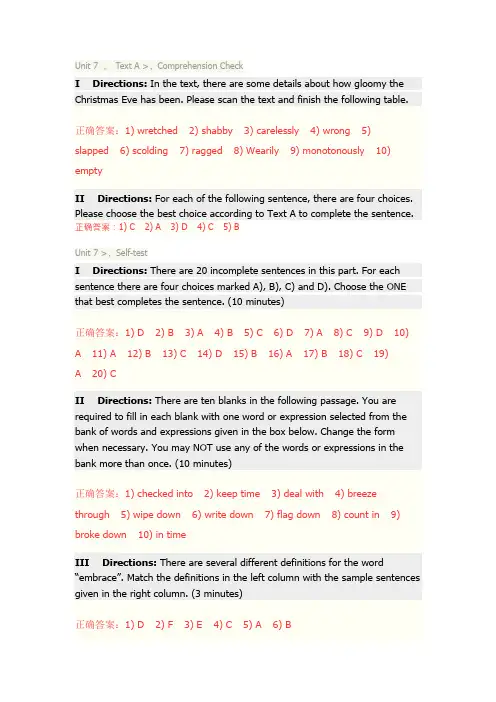
Unit 7 ,Text A >,Comprehension CheckI Directions: In the text, there are some details about how gloomy the Christmas Eve has been. Please scan the text and finish the following table.正确答案:1) wretched 2) shabby 3) carelessly 4) wrong 5)slapped 6) scolding 7) ragged 8) Wearily 9) monotonously 10) emptyII Directions: For each of the following sentence, there are four choices. Please choose the best choice according to Text A to complete the sentence. 正确答案:1) C 2) A 3) D 4) C 5) BUnit 7 >,Self-testI Directions: There are 20 incomplete sentences in this part. For each sentence there are four choices marked A), B), C) and D). Choose the ONE that best completes the sentence. (10 minutes)正确答案:1) D 2) B 3) A 4) B 5) C 6) D 7) A 8) C 9) D 10)A 11) A 12)B 13)C 14)D 15) B 16) A 17) B 18) C 19)A 20) CII Directions: There are ten blanks in the following passage. You are required to fill in each blank with one word or expression selected from the bank of words and expressions given in the box below. Change the form when necessary. You may NOT use any of the words or expressions in the bank more than once. (10 minutes)正确答案:1) checked into 2) keep time 3) deal with 4) breeze through 5) wipe down 6) write down 7) flag down 8) count in 9) broke down 10) in timeIII Directions: There are several different definitions for the word “embrace”. Match the definitions in the left column with the sample sentences given in the right column. (3 minutes)正确答案:1) D 2) F 3) E 4) C 5) A 6) BIV Directions: Complete the following sentences by using the correct forms of the words that have been given in brackets. (2 minutes)正确答案:1) Feeling 2) Not knowing 3) Hearing 4) leaving 5) reading。


Unit 1 对F的赞美1今年将有好几万的十八岁青年毕业,他们都将被授予毫无意义的文凭。
这些文凭看上去跟颁发给比他们幸运的同班同学的文凭没什么两样.只有当雇主发现这些毕业生是半文盲时,文凭的效力才会被质疑。
2最后,少数幸运者会进入教育维修车间——成人识字课程,我教的一门关于基础语法和写作的课程就属于这种性质。
在教育维修车间里,高中毕业生和高中辍学生将学习他们本该在学校就学好的技能,以获得同等学力毕业证书。
他们还将发现他们被我们的教育体系欺骗了。
3在我教课的过程中,我对我们的学校教育深有了解。
在每学期开始的时候,我会让我的学生写一下他们在学校的不快体验.这种时候学生不会有任何写作障碍!“我希望当时有人能让我停止吸毒,让我学习。
"“我喜欢参加派对,似乎没人在意.”“我是一个好孩子,不会制造任何麻烦,于是他们就让我考试通过,及时我阅读不好,也不会写作。
”很多诸如此类的抱怨。
4我基本是一个空想社会改良家,在教这门课之前我将孩子们的学习能力差归咎于毒品、离婚和其他妨碍注意力集中的东西,要想学习好就必须集中注意力。
但是,我每一次走进教室都会再度发现,一个老师在期望学生全神贯注之前,他必须先吸引学生的注意力,无论附近有什么分散注意力的东西。
要做到这点,有很多种办法,它们与教学风格有很大的关系。
然而,单靠风格无法起效,有另一个办法可以显示谁是在教室里掌握胜局的人。
这个办法就是亮出失败的王牌。
5我永远也忘不了一位老师亮出那张王牌以吸引我的一个孩子的注意.我的小儿子是个世界级的万人迷,学习不怎么动脑筋却总能蒙混过关.直到施蒂夫特夫人当了他的老师,这种局面才彻底改变了。
6当她教我儿子英语时,我儿子是一个高中高年级学生。
“他坐在后排和他的朋友说话.”她告诉我。
“你为什么不把他换到前排来?”我恳求道。
我相信令他难堪的做法会让他安心学习。
施蒂夫特夫人从眼睛上方冷冷地看着我.“我不会换高年级学生的座位."她说,“我会给他们不及格的成绩."我大感紧张。
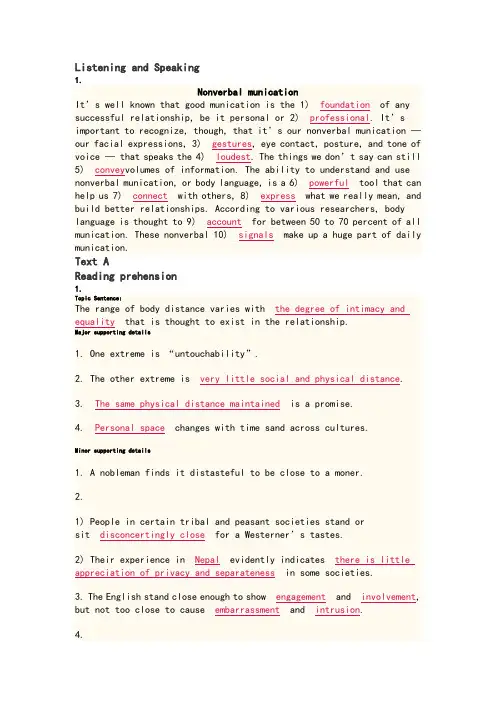
Listening and SpeakingReading prehension3.Key for reference2) Cultural misunderstandings can occur when people don’t share or understand the rules of a particular culture. The rules of how you behave are to do with what people expect you to do in certain situations. People can learn the rules of a new culture by watching people and through asking questions. It is cultural values that lead to expectations and rules about how people behave.Language in Use∙1) symbolize∙2) involved∙3) appreciates ∙4) extend∙5) engaging∙6) embarrassed ∙7) intimate∙8) associations ∙9) equality∙10) threatened5.∙1) stretch out∙2) vary with∙3) associate with∙4) drop in∙5) ment on∙6) fended off∙1) physical distance∙2) long distance∙3) personal space∙4) living space∙5) current situation∙6) walking distance∙7) parking space∙8) financial situation7.∙1) check-in∙2) feedback∙3) update∙4) sweetheart∙5) crossroad∙6) earthquake∙7) highlight∙8) real estate8.Reference translation1) 人和人之间的身体距离因其关系亲疏和地位高低而不同。

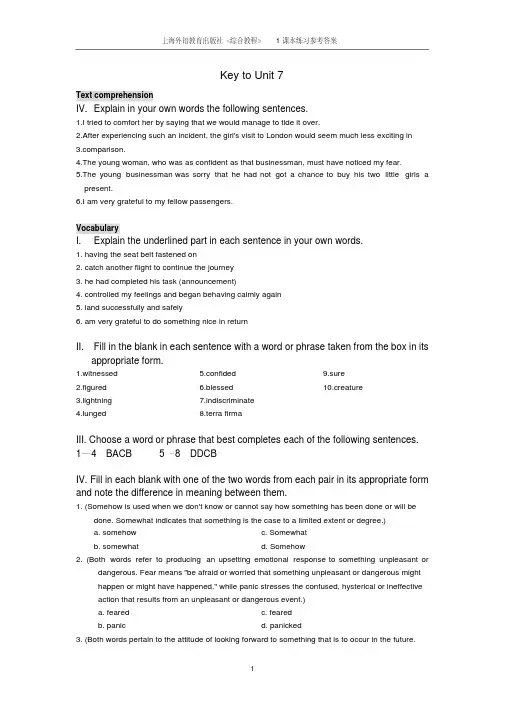
Key to Unit 7Text comprehensionIV.Explain in your own words the following sentences.1.I tried to comfort her by saying that we would manage to tide it over.2.After experiencing such an incident, the girl's visit to London would seem much less exciting inparison.4.The young woman, who was as confident as that businessman, must have noticed my fear.5.The young businessman was sorry that he had not got a chance to buy his two little girls apresent.6.I am very grateful to my fellow passengers.VocabularyI.Explain the underlined part in each sentence in your own words.1. having the seat belt fastened on2. catch another flight to continue the journey3. he had completed his task (announcement)4. controlled my feelings and began behaving calmly again5. land successfully and safely6. am very grateful to do something nice in returnII.Fill in the blank in each sentence with a word or phrase taken from the box in its appropriate form.1.witnessed2.figured3.lightning4.lunged5.confided6.blessed7.indiscriminate8.terra firma9.sure10.creatureIII. Choose a word or phrase that best completes each of the following sentences. 1—4 BACB 5 – 8 DDCBIV. Fill in each blank with one of the two words from each pair in its appropriate form and note the difference in meaning between them.1. (Somehow is used when we don't know or cannot say how something has been done or will bedone. Somewhat indicates that something is the case to a limited extent or degree.)a. somehowb. somewhatc. Somewhatd. Somehow2. (Both words refer to producing an upsetting emotional response to something unpleasant ordangerous. Fear means "be afraid or worried that something unpleasant or dangerous might happen or might have happened," while panic stresses the confused, hysterical or ineffective action that results from an unpleasant or dangerous event.)a. fearedb. panicc. fearedd. panicked3. (Both words pertain to the attitude of looking forward to something that is to occur in the future.Hope suggests looking forward exclusively to some positive or favorable outcome. Structurally,it should be followed by either a nominal clause or an infinitive, or used intransitively. Anticipate is restricted to thoughts of the future of either a pleasant outcome or an unpleasant one. Normally, it is followed by a nominal phrase, and occasionally by a nominal clause.)a. hopeb. hopec. anticipatingd. anticipate4. (Both words indicate continued existence. Survive emphasizes the successful overcoming of an ordeal or threat to existence. It can be used both transitively and intransitively. Live means "have life or function as an animate organism." It is basically an intransitive verb, and if used transitively, it must be followed only by a cognate object, as in the exercise.)a. survivingb. survivec. lived. liveV.Give a synonym or an antonym of the word underlined in each sentence in the sense it is used.1.open (unlock, unlatch, unchain)2.hopelessly (unconfidently, despairingly)3.think (believe, imagine)4.unafraid (brave, bold, fearless, dauntless)5.unselective (uncritical, random)6.enjoyable (comfortable, agreeable, pleasant)7.grumble8.lightly (barely, hardly, scarcely)VI.Fill in the blank in each sentence with an appropriate form of the given capitalized word in brackets.1.ungrateful2.shortage3.unfortunately4.invaluable5.lengthen6.destruction7.timely8.rustlessGrammarI. Identify the different infinitive forms after the modal auxiliaries.(When a modal auxiliary takes the predictive meaning, the infinitive after it may appear in the perfect form to denote "past time" and in the progressive form to denote "future time." When the modal auxiliary takes the non-predictive meaning, the infinitive after it usually appears in its base form as in sentences 6 and 7.)II. Rewrite the following sentences,using ―modal auxiliary+the correct form of the infinitive‖.1.He may know the answer.("May" is used to show that something is possible.)2.It must have been difficult.("Must" is used to show that something is very likely or certain.)3.He couldn't have forgotten his appointment.("Couldn't" is used to show that it is not possible.)4.She must be coming tomorrow.5.We ought to help people in need.6.May/Can I say something?(Both "may" and "can" express permission. "May" is more formal than "can.")7.He may have gone to the museum.8.You ought to have apologized.("You ought to have done sth." means "You didn't do it but it would have been the right thing to do.")III. Rewrite the following sentences,using be going to.("Be going to" can express intention as in sentences 1, 3, 4, 6, 7, and prediction as insentences 2, 5, 8.)1.When are you going to start?2.I'm sure it is going to rain.3.I'm going to take a few days' holiday.4.When are you going to sell it?5.I'm sure there is going to be trouble.6.We are going to have dinner out.7.I'm going to watch the news.8.We're going to be late for the party.IV. Decide which of the underlined parts is correct.1.I'm going("Be going to" refers to a premeditated intention.)2.I'll carry("Will" refers to an unpremeditated intention.)3.I won't tell("Won't" here expresses the speaker's resolution.)4.I'm going to be("Be going to" refers to a prediction based on the present symptom, sign or evidence.)5.are you meeting(The present progressive indicates the future fulfillment of the present plan.)6.It's going to rain7.I'll post it8.is going to takeV. Fill in the blanks with the proper form of the verbs in brackets.1. had listened(This is a conditional with mixed time reference. The past perfect in the if-clause refers to an event that was not real. "Wouldn't be" in the main clause refers to the state that is not real now.)2. could(In the clause following "wish," "would rather," "it's time," "as if," we use the past tense when we talk about an idea that is not real.)3. knew4. had5. were / was(We can use "were" or "was" to show the hypothetical meaning.)6. didn't have7.knew8.had meant(We use the past perfect of "mean," "wish," "expect," "want," etc. when we talk about an unfulfilled intention.)TranslationI. Translate the following sentences into Chinese.1.我踉踉跄跄向座位冲过去时,乘客们抬起头来望着我,满脸惊恐,似乎感到死期已到。
大学综合英语教材1目录Unit 1: Welcome to College Life1.1 Introduction to College Life1.1.1 Transition from High School to College1.1.2 Importance of Time Management1.1.3 Developing Effective Study SkillsUnit 2: English Grammar and Vocabulary2.1 Parts of Speech2.1.1 Nouns and Pronouns2.1.2 Verbs and Tenses2.1.3 Adjectives and Adverbs2.1.4 Prepositions and Conjunctions2.1.5 Interjections and Articles2.2 Vocabulary Expansion2.2.1 Word Formation2.2.2 Synonyms and Antonyms2.2.3 Idioms and PhrasesUnit 3: Reading and Comprehension3.1 Understanding the Main Idea3.1.1 Identifying Supporting Details 3.1.2 Making Inferences and Predictions 3.2 Types of Texts3.2.1 Fiction and Non-Fiction3.2.2 Newspaper Articles3.2.3 Academic TextsUnit 4: Listening and Speaking Skills 4.1 Active Listening Strategies4.1.1 Note-Taking Techniques4.1.2 Recognizing Nuances in Speech 4.2 Oral Communication4.2.1 Participating in Group Discussions 4.2.2 Making Oral Presentations4.2.3 Expressing Opinions and Debating Unit 5: Writing Skills5.1 The Writing Process5.1.1 Pre-Writing Strategies5.1.2 Drafting and Revising5.1.3 Editing and Proofreading5.2 Types of Writing5.2.1 Descriptive Writing5.2.2 Narrative Writing5.2.3 Argumentative WritingUnit 6: Global Issues and Culture 6.1 Environment and Sustainability 6.1.1 Climate Change6.1.2 Pollution and Conservation 6.2 Cultural Awareness6.2.1 Cross-Cultural Communication 6.2.2 Stereotypes and Prejudices 6.2.3 Cultural EtiquetteUnit 7: Literature and Language7.1 Introduction to Literature7.1.1 Elements of Fiction7.1.2 Literary Genres7.1.3 Analyzing Poetry7.2 Language Variation7.2.1 Dialects and Accents7.2.2 Sociolinguistics7.2.3 Language ChangeUnit 8: Grammar in Context8.1 Sentence Structure8.1.1 Simple, Compound, and Complex Sentences 8.1.2 Sentence Fragments and Run-ons8.2 Grammar Usage and Mechanics8.2.1 Subject-Verb Agreement8.2.2 Punctuation Rules8.2.3 Capitalization and SpellingUnit 9: Test-Taking Strategies9.1 Exam Preparation9.1.1 Creating a Study Plan9.1.2 Test Anxiety Management9.2 Test-Taking Tips9.2.1 Multiple Choice Questions9.2.2 Short Answer and Essay Questions9.2.3 Time Management TechniquesUnit 10: Language and Culture10.1 Language Acquisition10.1.1 First Language Acquisition10.1.2 Second Language Acquisition 10.2 Intercultural Communication10.2.1 Nonverbal Communication10.2.2 Cultural AdaptationUnit 11: Current Events and Debates 11.1 Global Issues11.1.1 Social Justice11.1.2 Human Rights11.2 Debating Skills11.2.1 Analyzing Arguments11.2.2 Constructing a Persuasive Speech Unit 12: English for Specific Purposes 12.1 Business English12.1.1 Writing Business Emails12.1.2 Business Vocabulary and Idioms 12.2 Academic Writing12.2.1 Research Methods and Citations12.2.2 Writing a Literature ReviewThis is a sample outline for the contents of a comprehensive English textbook for college-level students. It covers a variety of language skills including grammar, vocabulary, reading, listening, speaking, and writing. Additionally, it incorporates cultural and global issues, literature, test-taking strategies, language acquisition, and specific purposes such as business English and academic writing. The outline provides a structured and organized approach to teaching and learning English, allowing students to develop the necessary skills and knowledge for effective communication in academic, professional, and social contexts.。
Unit 7: Living in the FuturePart 1: Introduction1.1 Overview of the UnitIn Unit 7, we will explore the theme of "Living in the Future." This unit will focus on discussing various aspects of future life, including technological advancements, environmental issues, and societal changes. We will engage in discussions, debates, and presentations to enhance our English language skills while delving into thought-provoking topics.1.2 Learning ObjectivesBy the end of this unit, students should be able to:- Discuss the potential impact of technology on future living - Analyze and discuss environmental challenges and solutions - Debate societal changes and their implications- Deliver a presentation on a future-oriented topicPart 2: Vocabulary and Language Functions2.1 Key VocabularyThis section will introduce new vocabulary related to future living, such as technological terms, environmental terms, and words related to societal changes. Students will practice usingthe new vocabulary in various exercises and activities to enhance their language proficiency.2.2 Language FunctionsIn this section, students will learn and practice language functions that are essential for discussing future scenarios, such as making predictions, expressing possibilities, and speculating about the future. Through interactive exercises, students will be proficient in using these language functions in both spoken and written contexts.Part 3: Reading and Comprehension3.1 Reading TextsThe unit will include a variety of reading texts that focus on different aspects of living in the future. These texts may cover topics such as futuristic technology, sust本人nable living, or societal trends. Students will engage in readingprehension activities to enhance their understanding of the texts and develop their critical thinking skills.3.2 Discussion QuestionsFollowing the reading texts, students will participate in group discussions based on thought-provoking questions related tothe readings. These discussions will encourage students to express their opinions, support their arguments with evidence from the texts, and engage in constructive dialogue with their peers.Part 4: Speaking and Listening4.1 Speaking ActivitiesThis section will provide opportunities for students to engage in various speaking activities, such as role-plays, debates, and group discussions. By actively participating in these activities, students will improve their speaking skills, fluency, and ability to articulate their thoughts on future-oriented topics.4.2 Listening ComprehensionStudents will listen to audio recordings related to future living andpleteprehension tasks to test their listening skills. These listening activities will expose students to different accents, speech patterns, and conversational styles, thereby enhancing their ability to understand spoken English in real-life contexts.Part 5: Writing and Presentation5.1 Writing TasksIn this section, students will be assigned writing tasks thatrequire them to articulate their thoughts and ideas about future living. These tasks may include opinion essays, argumentative essays, or creative writing exercises that encourage students to showcase their language proficiency and critical thinking skills.5.2 Presentation SkillsStudents will prepare and deliver presentations on future-oriented topics of their choice. This will allow them to demonstrate their public speaking abilities, present information in a clear and organized manner, and engage their peers in constructive discussions about the future.Part 6: Assessment and Evaluation6.1 Formative AssessmentsThroughout the unit, students will be assessed through formative assessments, such as quizzes, class participation, and performance in various activities. These assessments will provide ongoing feedback to students and help them track their progress in mastering the unit's content and language skills.6.2 Summative AssessmentAt the end of the unit, students will be assessed through a summative evaluation, which may include aprehensive test, awritten assignment, and a presentation. This assessment will gauge students' overall understanding of the unit's content and their ability to effectivelymunicate and express their thoughts on future living.Part 7: Extension Activities7.1 Field Trips and Guest SpeakersAs an extension of the unit, students may have the opportunity to participate in field trips to relevant locations, such as science museums, environmental organizations, or technologypanies. Additionally, guest speakers may be invited to share their expertise on future-oriented topics and engage students in discussions and QA sessions.7.2 Project-Based LearningStudents may engage in project-based learning activities that involve researching, designing, and presenting a project related to living in the future. This collaborative, hands-on approach will allow students to apply their knowledge and creativity to real-world scenarios and showcase their skills in a culminating project.In conclusion, Unit 7: Living in the Future will provide studentswith aprehensive and engaging exploration of future-oriented topics, equipping them with the language skills, critical thinking abilities, and global awareness necessary for living and thriving in a rapidly changing world. Through a variety of interactive activities, discussions, and assessments, students will g本人n valuable insights and develop their language proficiency in the context of futuristic themes.。
全新版⼤学英语综合教程1Unit7课后答案全新版⼤学英语综合教程1Unit7课后答案 全新版⼤学英语综合教程1是⼤⼀新⽣的英语教材,同时兼顾语⾔知识、应⽤技能、学习策略和跨⽂化交际等⽅⾯内容的有机融合。
下⾯是⼩编分享的Unit7课后答案,欢迎⼤家阅读! Unit 7 Content Questions Pair Work 1. He thinks animals will probably do their best thinking when it serves their own purposes, not when scientists ask them to. 2. Because he believes they may encounter animal intelligence in their daily life. 3. He regards them as a new window on animal intelligence. 4. She wanted to get more pineapple. 5. He expanded the money supply by breading chips in two. 6. It shows he is clever and sly. He ate up the fruit leaving nothing but stems to share with Miles. 7. They say that animals cooperate when they learn it is in their interest to do so. 8. The author thinks that what behaviorists say is right, but he doesn’t think their explanation is satisfactory enough. 9. Because Orky was the most intelligent animal she had worked with. 10. Corky is a female whale because she is Orky’s mate and delivered a baby whale. 11. Because she thought the orange must have rolled off somewhere inaccessible. 12. Towan hid his orange underneath his foot. The act reveals some animals are intelligent enough to know how to deceive. Text Organization 1. Eugene Linden wants to tell the reader that animals do have, at least, some limited intelligence, and the personal experiences of those who are in close contact with animals are more convincing evidence than that any experiments can provide. 2. Let’s Make a Deal: Some animals are intelligent enough to know how to bargain with people. Tale of a Whale: Animals like whales can assess a situation and act accordingly. Primate Shell Game: Animals can attempt to deceive. Language Sense Enhancement (2) consciousness (3) explore (4) serves their own purposes (5) encounter (6) lack of it (7) convinced (8) mental feats (9) captivity (10) humans Language Focus I. Vocabulary 1) go (very) far 2) has expanded 3) in the interest(s) of 4) only to 5) encountered 6) has cooperated 7) assessed 8) (had) switched 9) horizons 10) gaze 11) disaster 12) wiped out 2. 1) … a long/long running controversy over whether the book should be published or not 2) … felt relieved after her first meeting with Tom had gone smoothly 3) ... suddenly went wrong with my computer when I was in the middle of writing the essay 4) … is obvious that our company is still maintaining its composition as market leader in software. 5) … give in until they give her a pay rise 3. 1) have undertaken, original, to explore 2) evidence convinced, underneath, extending to 3) to negotiate, encounter, to figure out, explore II. Confusable Words 1.firstly 2. first, first 4. First/Firstly 5. first 6. First 7. at first 8. first III. Usage 1. animal intelligence whose 2. zoo keeper where 3. eye contact through what 4. money supply of what 5. killer whale what kind 6. baby whale how old 7. family member of what 8. sea turtle what kind/where Comprehensive Exercises I. Cloze (1) emergency (2) evidence (3) original (4) sizing up (5) negotiates (6) reveal (7) make a deal (8) dominant (9) in their interest(s) (10) deceiving (11) controversy (12) judgment (13) explore 2. (1) protect (2) However (3) type (4) situation (5) sights (7) rang (8) associate (9) without (10) environment II. Translation 1. 1) A local business undertook the project but went bankrupt before it was completed. 2) Let’s make a deal—you wash my car, and I’ll let you use it tonight. 3) We got to the village which we thought must have been wiped out in the severe earthquake, only to find it slightly damaged. 4) My garden is dry and shady—few plants thrive in that condition 5) Mystery still surrounds the exact truth behind the film star’s death/exact circumstance of the film star’s death. 2. When I was young I used to visit the zoo in my hometown. There what attracted me most was a couple of tigers, especially the male. They were dept in a huge iron cage at first, but later were released from it and moved to a place called Tiger Hill. Twenty years later I revisited the zoo and was relieved to find Tiger Hill was still there, but greatly extended. Moving around now were six tigers, old and young, instead of two!。
Unit 7 The Fun They HadMain idea:This narrative story is a science fiction telling a story happening in the year of 2157. Margie and Tommy found a book in 21st century and they know something from the book about education in 21st century. Also, from the dialogue between Margie and Tommy, we, the people in 21st century know something of the education in the future predicted and imagined by the author. Structural AnalysisThis text can be divided into three parts.Part I (paragraph 1):This paragraph, which serves as the background of the story, tells us the time, characters, and the real book around which the story evolves.Part II (paragraphs 2-30):This part tells the story: Margie’s school life and school life of hundreds years ago she got from a book.Part III (paragraphs 31—35):This part tells Margie’s schoolroom, the mechanical teacher and Margie’s psychological activities Text Explanationhead1) lead; be at the front of; be at the top ofE.g.: The president’s car headed the procession.This canyon heads the list of natural attractions.2) be in charge of; take charge ofe.g.: The sales director heads a team of 20 representatives.crinklyhaving many thin folds; (of hair) curlye.g.: My shirts were all crinkly when I got them out of the suitcase.Her hair is a bit crinkly, which makes her look much prettier.be supposed to1) have a duty or responsibility to do sth.E.g.: Everybody is supposed to bring a bottle to the party.You are not supposed to smoke in here.2) be generally considered to be; have the reputation of beingE.g.: I haven’t seen it myself, but it is supposed to be a very good film.…and it was awfully funny to read words that stood still instead of moving about the way they were supposed to—on a screen…and it was very amusing to read words that were motionless instead of moving the way they ought to – on a screenWhen you’re through with the book, you just throw it away, I guess.—When you have finished reading the book, you merely throw it away, I believe.When you have finished reading the book, you merely cast it away, I believe.through1) in at one side, end, or surface, and out at the other; all the waye.g.: The guard at the gate wouldn’t let us through.Does this train go right through to London?2) from the beginning to the end; to completione.g.: Have you read the letter right through?You should read the article through before you translate it.scornfulshowing contempt for;e.g.: His scornful laugh greatly embarrassed me.His scornful dismissal of the democratic process showed that he did not support it. What's there to write about school?This is a rhetorical question, which calls for no answer. A positive rhetorical question is negative in meaning. The rhetorical question here means: There is nothing at all to write about school. mechanical1) of or moved, worked, or produced by machinerye.g.: That factory manufactures a variety of mechanical products.Being a mechanical genius, that man is at home in mechanical applications.2) Done without thought or feeling; (done) from habit rather than wille.g.: He greeted me in a mechanical way by using mechanical compliments.superior:1) of a higher rank or class; better in quality or valuee.g.: Of the two books, this one is superior to that one2) of high qualitye.g.: This is a very superior make of car.Superior goods are very popular among the customers.regular:1) happening or appearing with the same amount of time or space between each one and the next; not varyinge.g.: Plant the seed at regular intervals.2) happening, coming or doing something again and again at the same times each day, week, month, etce.g.: We keep regular working hours.Mr. Smith is a regular customer of the small store.nonchalantly:indifferently, coldly, not feeling excitede.g.: He reacted nonchalantly to my suggestion.He treated me nonchalantly when I visited him.tuckv 1 (a) ~ sth into sth; ~ sth in/up, push or fold or turn the ends or edges (of cloth, paper, etc) so that they are hidden or held in place; draw (sth) together into a small space 将(布、纸等)的端部或边缘掖好、叠拢或卷起(使之看不见或固定住);将(某物)缩拢起来塞入狭小空间: e.g. tuck your trousers into your boots.He tucked up his shirt-sleeves.The nurse tucked her hair (up) under her cap.dispute1) (about, over, with) argue about sth. Esp. angrily and for a long timeThe two governments disputed over the ownership of the territory.The question was hotly disputed in the Senate.2) Disagree about or question the truth or correctness ofI dispute the Minister’s figures—the true cost of the project is much higher.adjustv 1) put (sth) into the correct order or position; alter (sth) by a small amount so that it will fit or be right for use; regulate 整理; 校准; 调准; 校正:She carefully adjusted her clothes and her hair before going out.adjust the rear mirror,2)~ (sth/oneself) (to sth) become or make suited (to new conditions); adapt 使适合(新环境等); 适应:The body quickly adjusts (itself) to changes in temperature.adjustable adjadjustmentlight up1) ignite; (cause to ) start to burn; give light toe.g.: The fire won’t light up.The stage was lit up by several powerful spotlights.2) cause to become bright with pleasure or excitement.e.g.: Suddenly, a smile lit up her face when she heard the news.Her face lit up with joy when she saw him coming.ExercisesParaphrase:1. Her mother asked the County Inspector to come over.2. The mechanical teacher finished the calculation of the mark very quickly.3. Tommy looked at Margie with an air which suggested he knew far better about school than others.4. A teacher, a computerized teacher on net, has to be changed slightly so as to be suitable for each boy and girl to learn from.Grammar:1.The usage of articles;2.“It … to do something” pattern.Translation:1. Yesterday a government delegation headed by the Minister of Foreign Affairs arrived in South Africa and began a three-day friendly visit to the country.2. It is awfully funny and splits your sides with laughter to observe these caricatures which satirize social ills.3. Computers are one of the most useful teaching aides, for all your lessons as well as all the questions asked and all the answers provided can be shown on a screen.4. As soon as his mother fell ill suddenly the day before yesterday, Xiao Zhang sent for a doctor, who came and diagnosed and treated his mother.5. He failed in the college entrance examination last year, but he did not feel disappointed. Instead, he continued to study hard, passed the examination successfully and became a student in a famousuniversity this year.6. There are many English words that this middle school student cannot pronounce correctly. Therefore, he has to make great effort to learn the phonetic symbols well and acquire standard English pronunciation.7. In this new ear marked by knowledge explosion and information explosion, we have to pursue constant study and take particular care to renew our knowledge. Only thus, can we become adjusted to the requirements of our specialized work.8. With his shirt tucked into the top of his trousers and a leather bag tucked under his arm, the boy looked just like a boss.9. Although she is only eight years old, the little girl is already very good at calculating fractions. No wonder her parents feel very proud of her.10. All the neighborhood have heard about the news, but you haven’t. Don’t you think it is very strange.Text II The LaugherMain idea:In this essay, the author introduces to the readers his occupation—a laugher. Being good at all kinds of laughter and portraying gaiety in work, the author, however, does not like his job and does not feel happy at all.Questions for discussion:1. He thinks that the nature of all the professions is clear and needs no further explanation.2. His talents in the field of mime and elocution are not good enough to meet the requirements of an actor.3. He is most probably a professional laugher, imitating the laughter of different kinds of people and of different occasions.4. He wants to stress that skill comes from practice.5. They do not feel at home in punch lines, as a result, their performance may fail to entertain its audience.6. He feels sad because he cannot change or control the way that things will happen.7. Like a pessimist, the author condemns his job because he thinks that it results in more pain than pleasure.8. He goes back to normal, and in fact the feels happy because he does not have to play the fool. Memorable QuotesJohann Wolfgang von GoetheGerman poet, novelist, playwright, courtier, and natural philosopher, one of the greatest figures in Western literature. In literature Goethe gained early fame with The Sorrows of Young Werther (1774), but his most famous work is the poetic drama in two parts, FAUST.Sir Francis Bacon (later Lord Verulam and the Viscount St. Albans) was an English lawyer, statesman, essayist, historian, intellectual reformer, philosopher, and champion of modern science.。